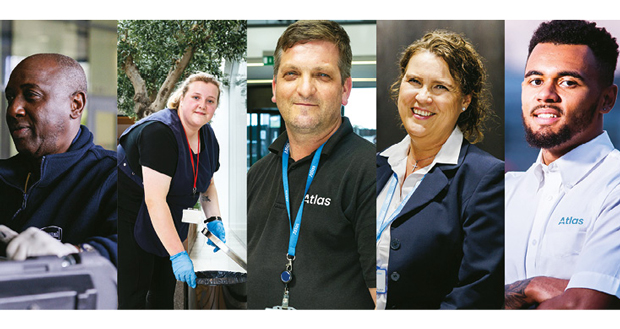 David Tarbuck Group Marketing & Communications Director, Atlas on the surprising results of a happiness survey carried out amongst its staff
David Tarbuck Group Marketing & Communications Director, Atlas on the surprising results of a happiness survey carried out amongst its staff
Every organisation has special people who make it tick. In our industry, the front-line workers come to mind first. Cleaners who make an office spotlessly clean and tidy every evening, ready for the next morning. Security officers who work all hours to keep people and premises safe. Technicians who make sure that building users are warm in winter and cool in summer. There are also special people who support them, such as customer service advisors and office-based teams who help customers with daily and urgent requirements.
During the pandemic, these individuals were still physically going into work and acting as flexibly as possible to meet clients’ ever-changing needs. Now we are in 2023 and what feels like a new environment. Today’s discussions focus on the cost of living, industrial action, changing working patterns, and staff and supply chain shortages.
In 1972, Bhutan’s King Jigme Singye Wangchuck declared that “Gross National Happiness is more important than Gross Domestic Product.” The country then began to measure the happiness of its citizens as a way of judging its success as a nation. Forty years later, Bhutan refined its Gross National Happiness Index and put forward a UN resolution, successfully adopted, which argued for a better approach to development, focused on happiness at the core.
The idea behind the index is to judge what is making people happy and understand why parts of the population are unhappy, so that public officials can come up with plans to address the causes. Bhutan shows us something that should be plainly obvious – everyone should be able to live a happy and fulfilled life; and where people are not doing so, we should try to do something about it.
Here in the UK, the Office for National Statistics now includes happiness on its national wellbeing dashboard. As of the last results in October 2019, only 35.4 per cent of Britons over 16 describe themselves as very happy. We have much to improve on.
CELEBRATING FM
Let’s turn to the positives and celebrate our own industry. For facilities management is a sector that is built on the very principle of “creating happiness” – indeed, that’s why Atlas adopted this as our motto. Everything we do is about enhancing the customer experience and trying to improve everyday lives. There are different routes to do so of course, giving rise to technology solutions, equipment innovations, and new best practice.
In all cases, the desired end result is to make customers happier. This is also the reason many employees choose FM as a career path – they take joy in helping others. In Atlas, this is essentially our purpose. But words on a page are useless without meaning.
We decided that our starting point for measuring happiness should be our own people. Naturally, we needed to understand our current position to give us a happiness baseline for the future. A survey was a good place to begin. It was the first time we have undertaken a specific happiness survey, and we didn’t want to replicate the annual style that employees expect.
In coming up with the questions, we kept the principle of happiness at the centre. Echoing the example set by Bhutan, we asked our people what made them happy and what caused them to be unhappy. It was entirely anonymous but quite particular in terms of the options and categories. People from across our company responded, whether they were full-time or part-time, site-based or office-based. We used a simple format to drive responses and be friendly on mobile devices as well as laptops.
I want to be as open as possible about what the survey told us. The good news is that our people are generally very happy to be working for Atlas, with a headline score way above comparative figures for good engagement (often seen as above 60 per cent in typical surveys). Our people are proud of the work they and their colleagues do. They like our culture and feel excited about the future.
CLIENT RECOGNITION
In terms of areas we need to work on, it will be no surprise to many that our people want access to new workplace innovations and more dynamic training opportunities. We are acting on this by rolling out a brand-new learning platform, which is now being road-tested by our Atlas Security business. Surprisingly, cost of living and compensation was nowhere near the top issue preventing more happiness.
What I found interesting was how happy staff feel being recognised by their own customers. This type of recognition can be more powerful than managerial or peer recognition, as it is the customers that front-line workers see most, and who customer service agents often speak to.
In our case, we encourage Atlas employees and managers to form close relationships with them. We see creating happiness as an important part of their roles, so we give them the autonomy to do so. It is a reason they stay with us; and why we have such positive staff retention rates.
The point is this: if we as an industry can create more happiness for our people, we will inspire them to create happier workplace experiences for customers. There will be business benefits, such as higher productivity and better contract retention, but more importantly our whole community will be a happier one. Isn’t that something to aim for?





